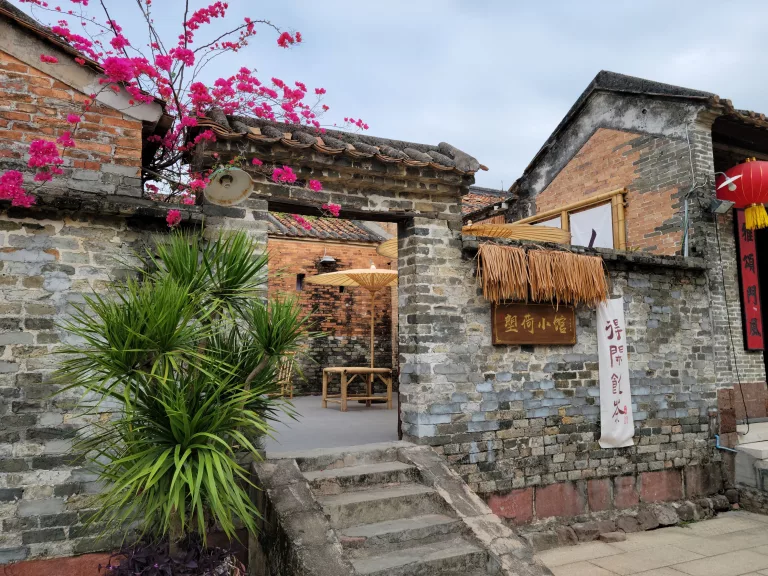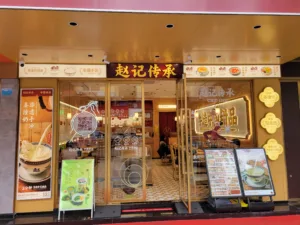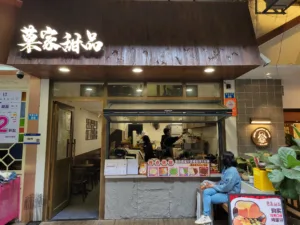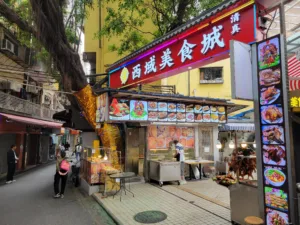Langtou Ancient Village is far up in the north of Huadu district and can be reached via Car from the city, or via metro first to Fei’eling station of line 9 and then from there by bus or car.
Note: You can download either Baidu Maps or Amap and navigate through the buttons below. You can also directly order a cab through the App. Learn more in this Guide.
Langtou Ancient Village (塱头古村)
Langtou Village in norther Guangzhou’s Huadu district is a very calm relaxing ancient village surrounded by beautiful nature. Langtou has maintained its original flair and is not touristic with fewer shops than elsewhere. On the other side there are many modern architectural elements well embedded into the original village, making it a stunning and simply beautiful place.


Location and Origin
Langtou Village, located in Tanbu Town, Guangzhou’s Huadu District, has a rich history and cultural heritage. The village got its name “Langtou” from the small hill near the lake that was covered with Lang grasses. Langtou was established in the 27th year of Emperor Zhizheng of the Yuan Dynasty (A.D. 1367) by the Huang family, who migrated from Zhuji Lane in Nanxiong County to Shenshan Town, now part of Baiyun District.


Village Structure and Environment
Langtou Village comprises three main areas:
Eastern and Central Langtou are approximately 210 meters wide, while Western Langtou is around 170 meters wide and separated from the other two areas by a small river called “Deep Pool”. The village has a tranquil environment with a large field in front, three half-moon-shaped pools, and numerous litchi, longan, and banyan trees. Two significant trees, a kapok and a banyan tree, were planted by the 11th generation ancestor, Le Xuan Gong, and are now 600 years old.


Architecture and Cultural Significance
Langtou Village is known as an “accomplished scholars village,” producing 15 Jinshi (top scholars in imperial exams), 10 Juren (provincial candidates), and 15 Xiucai (scholars) throughout its 600-year history. Langtou has a well-preserved collection of ancient architecture, including 388 black brick buildings from the Ming and Qing Dynasties. Among these are 34 ancestral halls, bookrooms, academies, and 5 blockhouses and gateways.


Key Structures
There are many small “museums” inside the village that showcase the villages craftmanship. Exhibitions about wooden furniture to agriculture are shown in small rooms all around. From time to time there are exhibitions from local artists or art students in these rooms.
Other key structures are:
- Huang’s Ancestral Shrine
- Guyi Duke’s Book Room
- Public Ancestral Temples for Lipo (Huang Hao) and Youlan (Huang Xueji)


Modern Cultural Integration
Architects at Atelier FCJZ have incorporated local materials such as red tiles and grey bricks into modern structures like Chun Yang Tai. This complex blends with the landscape through features like roof ponds filled with aquatic plants and elevated walkways, creating a “multi-level lotus pond system” that harmonizes with the natural surroundings


Traditions and Events
The villagers of Langtou maintain simple and natural traditions. For example, they celebrate birthdays collectively for residents aged 60 and above on July 21st each year, aligning with the death anniversary of the first ancestor. The village also practices an ancient custom of fish distribution at the end of each year.


Tourism and Attractions
Langtou Village is a national 3A-level scenic spot and one of China’s historic and cultural villages. Visitors can explore the ancestral halls, academies, forts, and memorial archways, and learn about local history at the folk culture hall. The village hosts cultural and artistic events, such as an exhibition featuring Chinese traditional paintings, oil paintings, woodblocks, and sculptures. It is to mention that although it is a touristic area, Langtou is not overflown with the usual touristic shops you see in other ancient villages.










